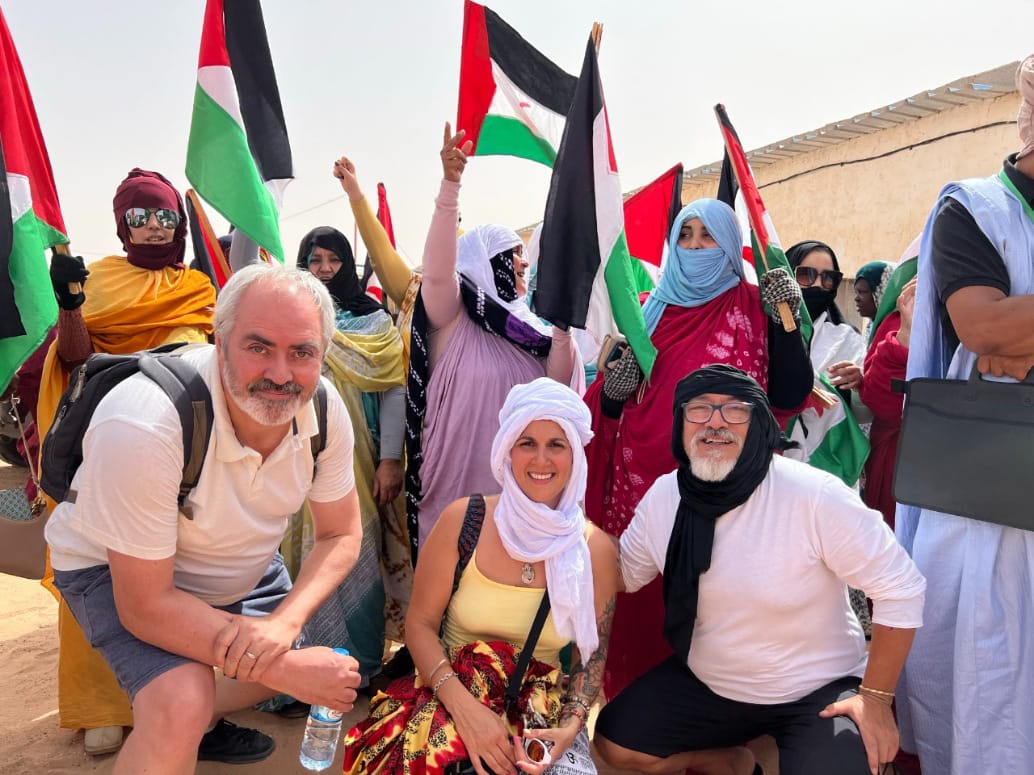Por Flor Salgueiro y Rubén Tzanoff
Del 20 al 22 de mayo, se realizó el 10º Congreso de la UJSARIO. Desarrolló su actividad en la wilaya Bojador, ubicada en los campamentos saharauis de Tinduf, Argelia. Tres jornadas de intensa actividad nos permitieron palpar la durísima realidad en que vive el pueblo saharaui. También pudimos percibir la voluntad de lucha por la libertad y la recuperación de los territorios usurpados. La delegación de la Liga Internacional Socialista que participó como invitada reafirmó su compromiso de apoyo a la lucha por la autodeterminación.
Un marco político complicado con un pueblo de pie
El Congreso se realizó en el marco del reinicio de las acciones bélicas entre el Frente Polisario y Marruecos. La ruptura de relaciones diplomáticas entre Argelia y Marruecos. El giro histórico del gobierno español hacia el apoyo al plan de autonomía de Mohamed VI y el agravamiento de la situación económico-social africana como consecuencia de la guerra en Ucrania. Marruecos logró avances en su ofensiva diplomática: el reconocimiento del imperialismo norteamericano, la creciente complicidad del bloque imperialista de la Unión Europea y el involucramiento económico-militar del Estado genocida de Israel. Es una situación compleja a la que el pueblo saharaui enfrenta movilizado y combatiendo.
La ubicación del Sahara Occidental y de los campamentos que visitamos
En el mapa se pueden ver los límites del Sahara Occidental con Marruecos, Mauritania y Argelia. Dentro de ese territorio viven saharauis en dos zonas: la que tiene mayor superficie, controlada por Marruecos y la más pequeña, controlada por el Frente Polisario. También se puede observar una línea que divide ambas zonas, es el “Muro de la Vergüenza”. Se trata de una construcción militar de una longitud superior a los 2.720 km, defendida por tropas marroquíes y el creciente uso de drones, a cuyo alrededor se han sembrado millones de minas antipersonales. Esta monstruosidad bélica constituye un verdadero apartheid a la población saharaui, cuyo objetivo es evitar el regreso a su tierra de los refugiados que viven en los campamentos de Tinduf, ubicados en Argelia, los cuales visitamos y también aparecen en el mapa.

La organización en los campamentos
En los campamentos de Tinduf se cuentan oficialmente 173.600 personas, aunque la cantidad real puede llegar a 200.000. Hay una enorme presencia femenina, ya que, aunque no es obligatorio, los varones están en el frente o emigrados buscando trabajo. Los campamentos se componen de cinco wilayas que llevan nombres de ciudades del Sahara Occidental: Bojador, Dajla, El Aaiún, Auserd y Smara. De ellas, conocimos Bojador y visitamos Smara. Cada wilaya, que es una unidad administrativa, se compone de algunas dairas que son pequeños grupos poblacionales. La administración central del Frente Polisario se encuentra en Rabuni.
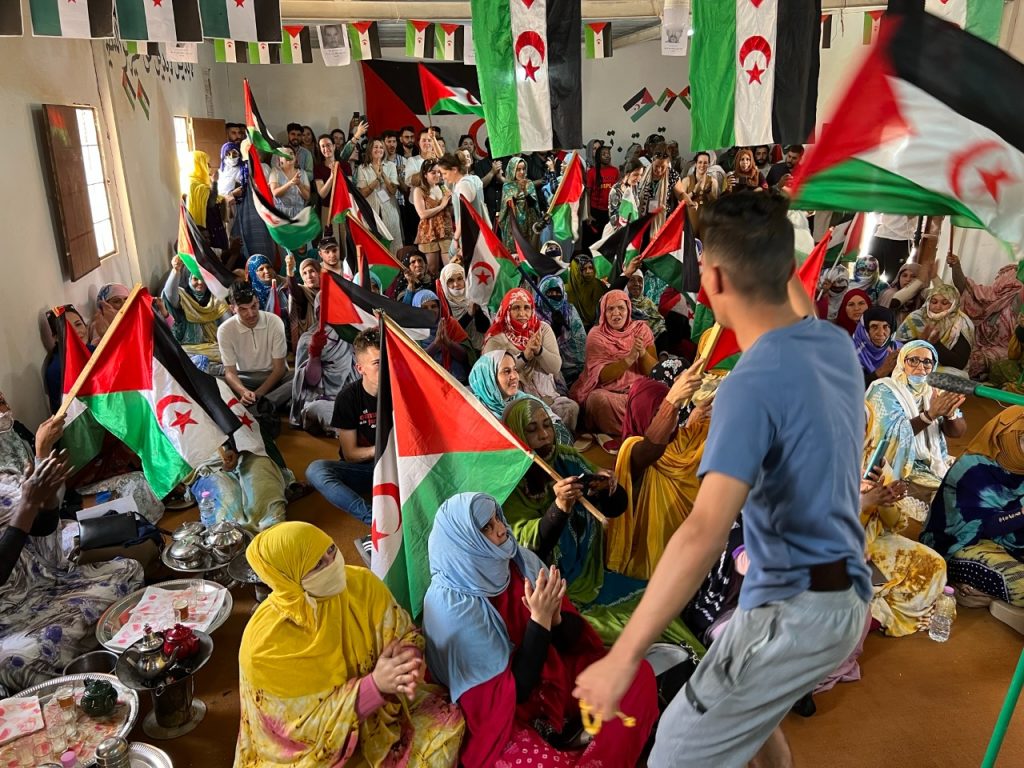
Las condiciones de vida son extremas
Las familias forzadas a abandonar su tierra hacen más de cuatro décadas viven en condiciones de extrema pobreza. Subsisten por la ayuda humanitaria, que no alcanza para detener la desnutrición infantil y las carencias alimentarias. Los campamentos se levantaron en medio de un árido desierto, cuyo clima azota con temperaturas que oscilan entre los 40 y 50º C. El débil suministro de energía eléctrica se interrumpe varias veces al día. No hay redes cloacales, de gas, ni de transporte. Hay muy pocas escuelas, servicios sanitarios y comercios. Sólo el 1% de los refugiados logra acceder a los estudios universitarios, que se cursan en Argelia u otro país. El agua que llega a las familias se almacena en tanques cerrados de lona. Las casas son de ladrillo o adobe, están junto a las jaimas, que son tiendas de campaña tradicionales. En ocasiones los vientos o las lluvias arrasan con los campamentos, como sucedió con las inundaciones de 2015.
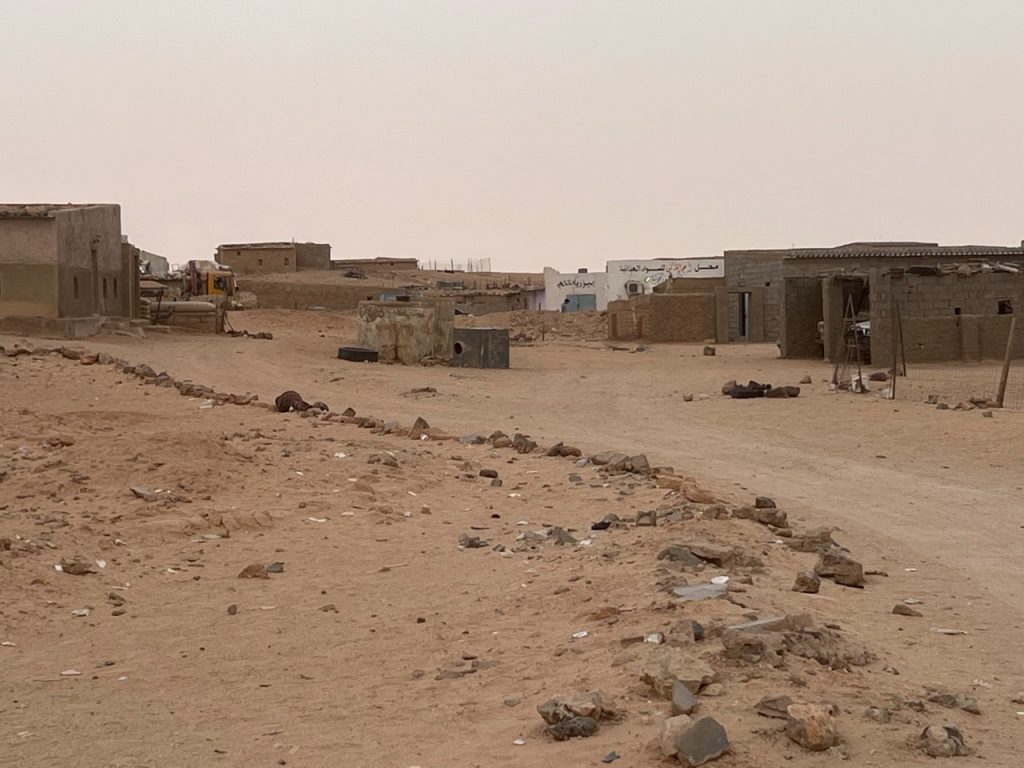
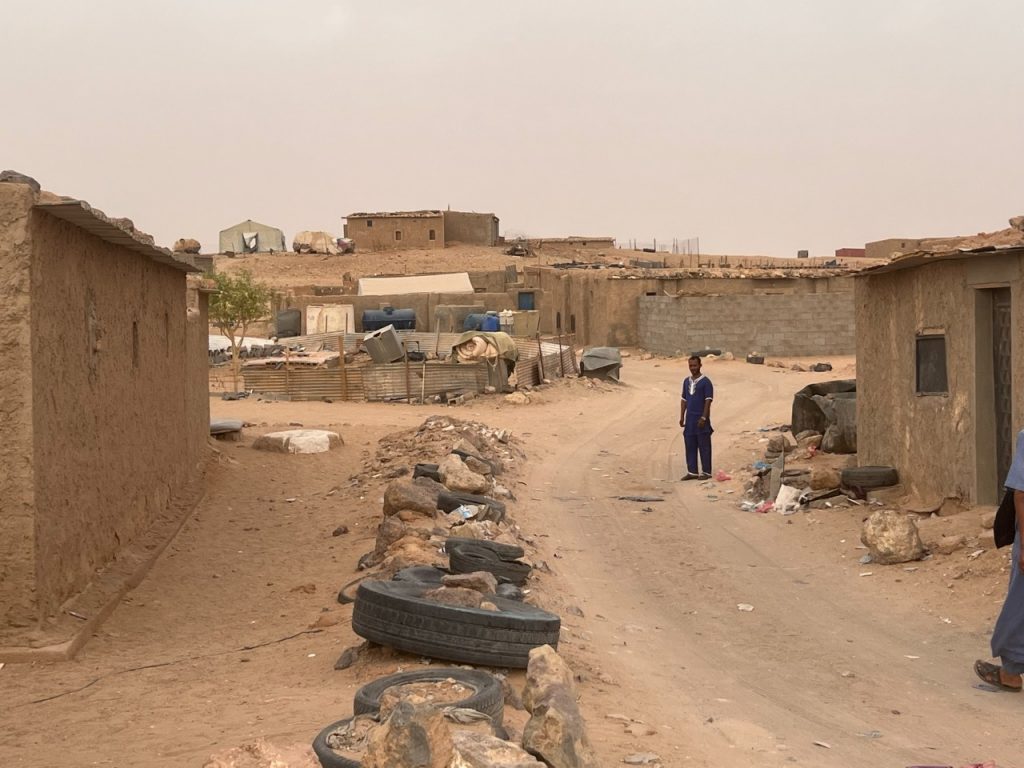
Realizamos una intensa actividad fortalecida por la calidez humana
El jueves 19 despegamos de Madrid junto a otras delegaciones internacionales. Por la noche arribamos al Aeropuerto de Tinduf y desde allí un convoy con escolta nos acompañó hasta la wilaya de Bojador, donde fuimos alojados. Desde el momento de la llegada hasta la despedida la noche del 22 de junio, sentimos una calidez humana sin límites. Nos recibió una familia compuesta de mujeres que compartió con nosotros el techo, el agua, el té y la comida con total naturalidad y sencillez. Esto nos dio más fuerza para realizar una intensa actividad.
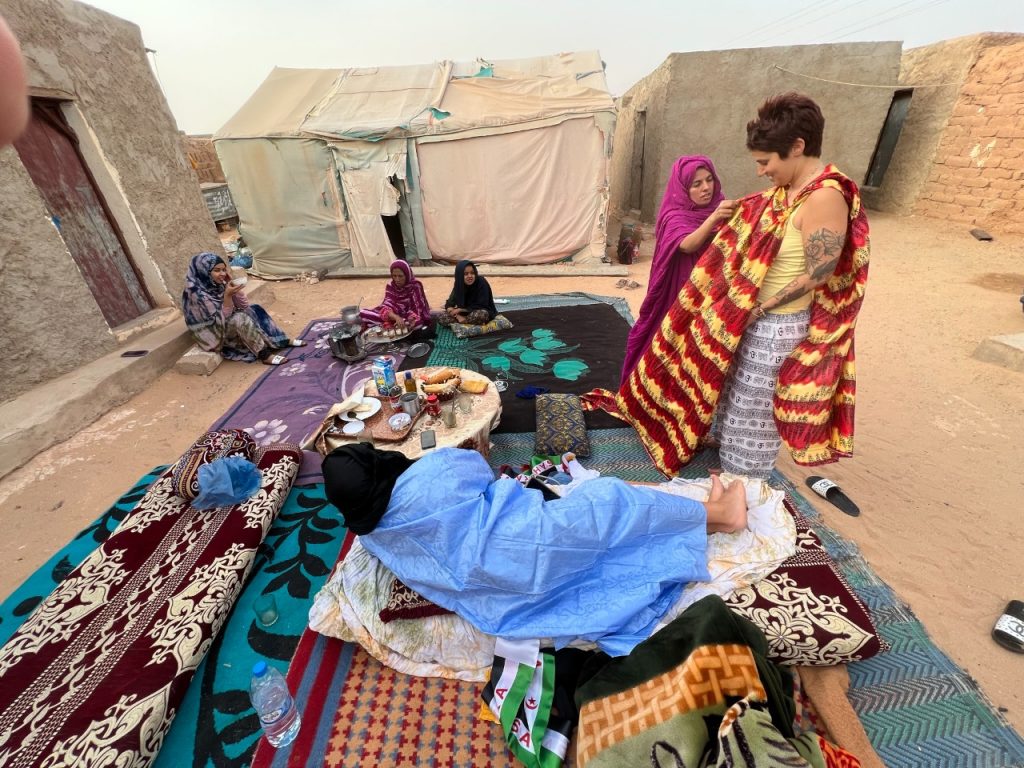
Los invasores violan los derechos humanos
Visitamos una organización defensora de los Derechos Humanos, el Museo de la Resistencia y otras instituciones sociales. En todos lados tomamos un contacto más cercano con la poco difundida situación de represión que sufren los saharauis en los territorios ocupados. Los activistas por la autodeterminación son perseguidos, encarcelados y enjuiciados. El ejemplo más conocido internacionalmente es el de la activista Sultana Khaya y su familia, retenida en su casa sin orden judicial, víctima de allanamientos, torturas y agresiones sexuales. La invasión ha provocado centenares de personas desaparecidas en lo que constituye un verdadero genocidio.
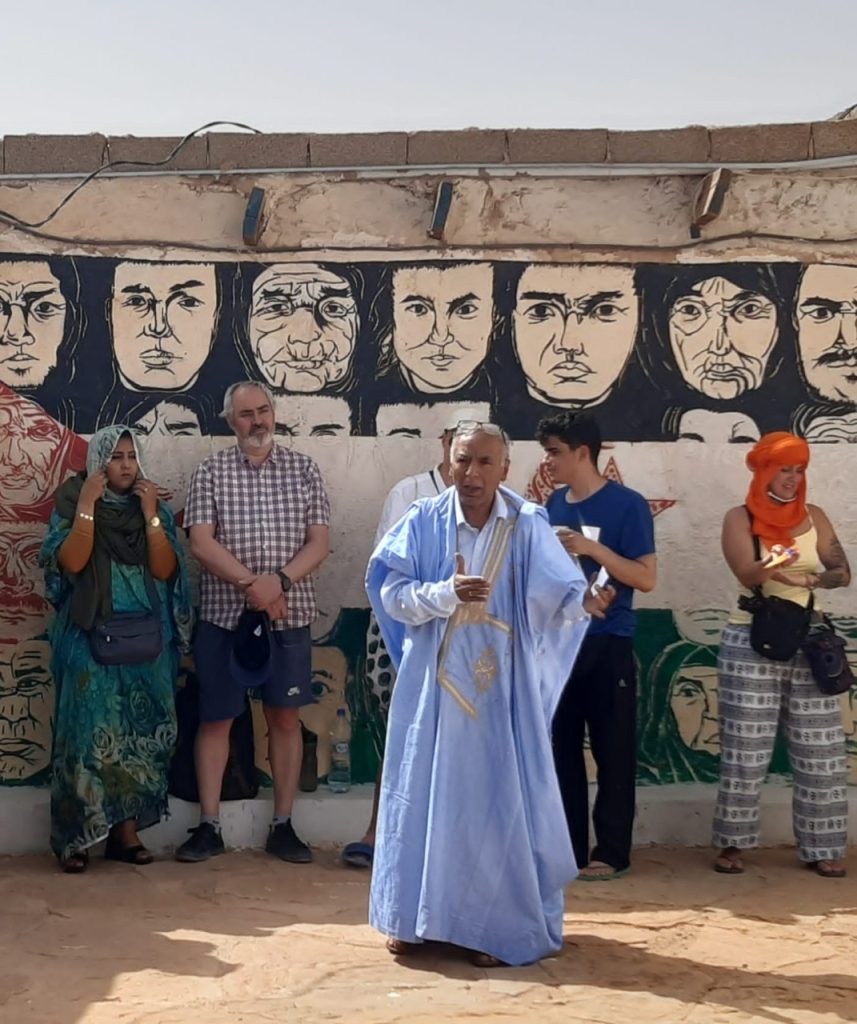
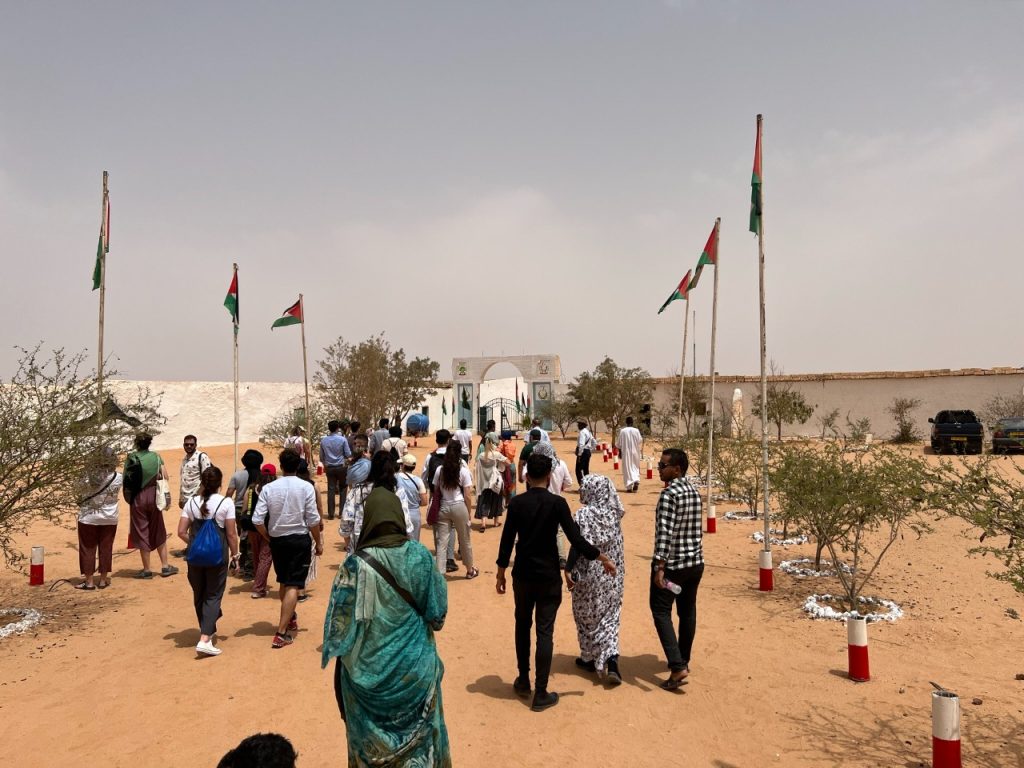
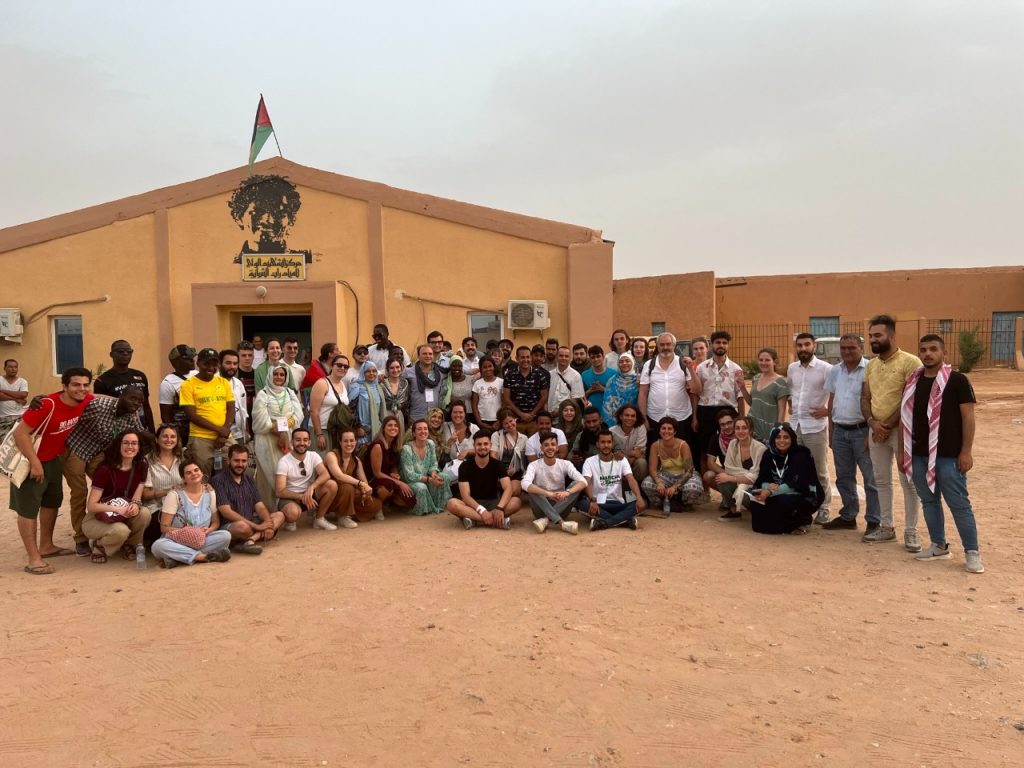
Acto inaugural y primeras palabras de la LIS
El Acto Inaugural se realizó en el Centro Bojador, con más de 500 delegados y alrededor de 150 invitados. El Congreso “Azmàn Ali Brahim” sesionó bajo el lema «La juventud saharaui, una fuerza movilizada y consciente para ganar la batalla del porvenir”. Comenzó con un espectáculo de música tradicional al que siguieron los discursos de bienvenida de la gobernadora de Bojador, Alaaza Babih; del secretario general de la UJSARIO, Mohamed Said Dadi y del secretario general del Frente Polisario y presidente del Sahara Occidental, Brahim Galli.
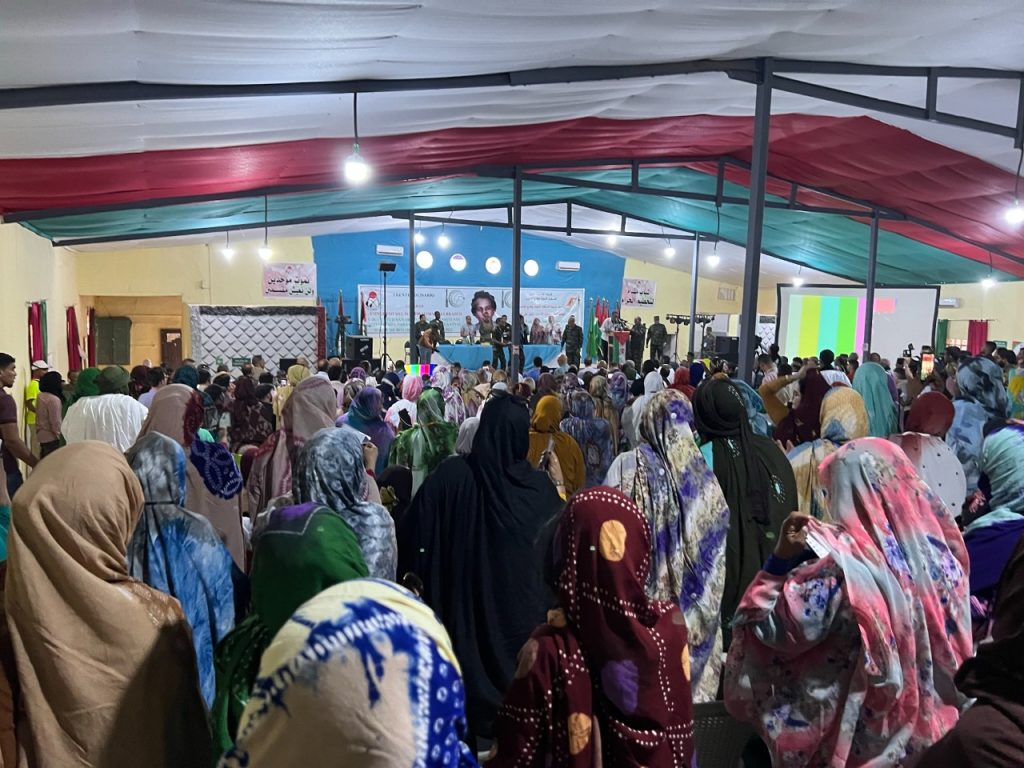
Entre las palabras de las delegaciones estuvo la de nuestro compañero Alejandro Bodart, dirigente de la Liga Internacional Socialista, quien expresó:
“…somos de una organización de revolucionarios que agrupa revolucionarios prácticamente en todos los continentes. Saludamos este acto, estamos convencidos que va a ser muy exitoso el Congreso que van a realizar los compañeros de la juventud. Nuestro compromiso incondicional es con la causa del pueblo saharaui. Ningún pueblo puede ser libre mientras haya un pueblo que no tiene la posibilidad de disfrutar de su libertad, de su autonomía y de decidir su propio futuro. Por eso, estamos a disposición de todas las resoluciones que se resuelvan para que la causa saharaui llegue hasta el último lugar del planeta. Sabemos que estamos en un momento muy complejo, que está el pueblo saharaui en un momento muy complejo, pero la única lucha que se pierde es la que se abandona. Por eso, en la medida que no abandonan la lucha, estamos convencidos que en el final del camino va a estar la libertad del pueblo saharaui, va a estar la posibilidad de la autonomía, va a estar la posibilidad de recuperar los territorios y la posibilidad de hacer justicia con todos los criminales que durante todos estos años han oprimido al pueblo saharaui. Como hay poco tiempo y para terminar, yo creo que todos los que somos conscientes del sufrimiento del pueblo saharaui, junto con impulsar en todos lados la defensa de esta causa tan justa, también tenemos que trabajar para que en nuestros propios países se avance en un proceso de liberación. Argentina, el país de donde yo vengo, no ha reconocido todavía a la República Saharaui Árabe Democrática, es una vergüenza que nuestro país no se haya sumado a los más de cuarenta países que ya reconocen esta República. Compañeros, compañeras, sí estamos en esta situación, sí ustedes están en esta situación, si nuestro pueblo en la Argentina somos una semi-colonia de los Estados Unidos, sí todavía estamos en todo el mundo sometidos a los designios del imperialismo, de los distintos imperialismos, de los nuevos imperialismos que están surgiendo, la tarea que tenemos todos los revolucionarios es trabajar en todos nuestros países para sacarnos de encima al yugo que nos somete, por impulsar la revolución socialista en nuestros países, por avanzar hasta que haya un mundo libre, una Latinoamérica unida y socialista, una África unida y socialista, un mundo sin explotación y sin opresión. Por eso, nuestro compromiso con la causa de ustedes es impulsar las causas de los trabajadores y los oprimidos en cada uno de los países donde estamos, porque si nos juntamos y nos unimos, no hay nadie que pueda impedir que nosotros ganemos compañeros. No nos dejemos ganar por el escepticismo, el capitalismo cada vez está peor, está pasando por una crisis terminal. Si todos los pueblos del mundo nos unimos y peleamos, podemos ganar y tener un futuro digno para todos nosotros y para toda la humanidad antes que la barbarie se apodere definitivamente de nuestro futuro. Gracias.”
Se conformó el Comité Directivo de Solidaridad con el Sáhara Occidental
El sábado 20 se hizo un plenario coordinado por Chaiaa Ahmed Baba y Hamdi Toubali, quienes trabajan en la representación exterior de la Juventud Saharaui. En el evento, las formaciones políticas y sociales expresaron un fuerte punto en común: la reivindicación de la causa por la autodeterminación del Sáhara Occidental. Entre ellas, cabe destacar la combativa y alegre presencia Palestina que reivindicó la lucha en común por la libertad de su pueblo y el saharaui. Las delegaciones expusieron sus propuestas de acción, entre las cuales estuvo la formulada por nuestra compañera Flor Salgueiro, en representación de Socialismo y Libertad (SOL) – Estado español que se encuentra en el siguiente video.
Posteriormente se conformó el Comité Directivo de Solidaridad con el Sahara Occidental al que se sumó nuestra compañera.
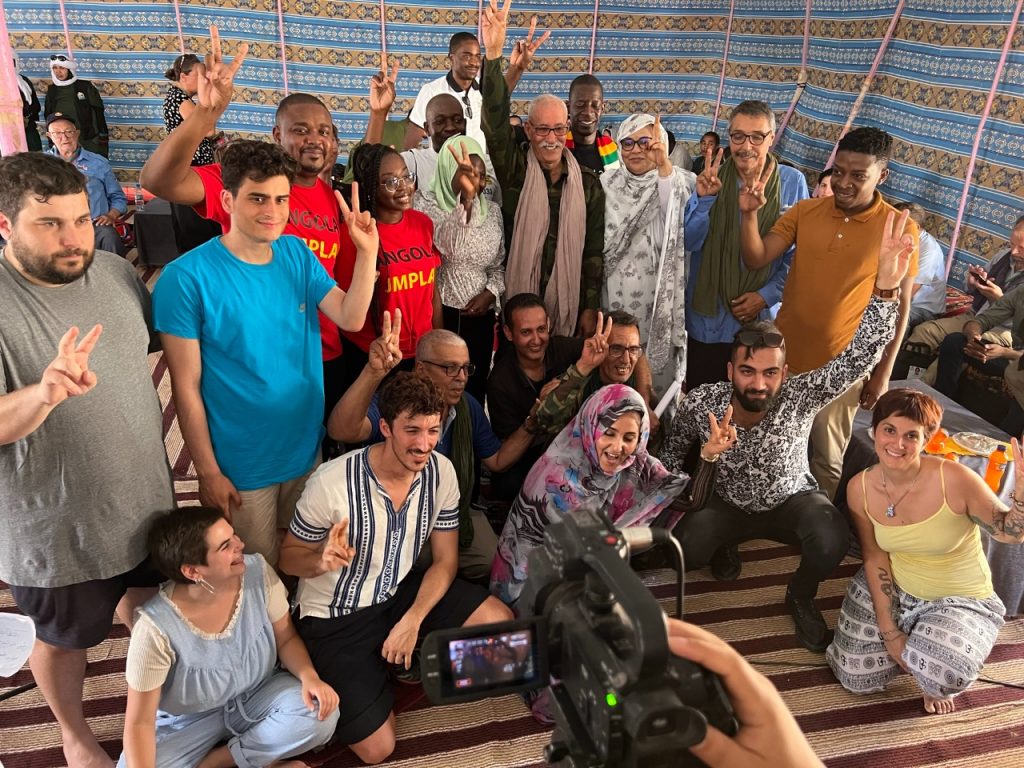
Despedida en la jaima
El último día en los campamentos nos trasladamos a una jaima montada para despedir a las delegaciones. Allí se hizo presente el presidente Brahim Galli. Entre los discursos de despedida estuvo el brindado por nuestro compañero Alejandro Bodart.
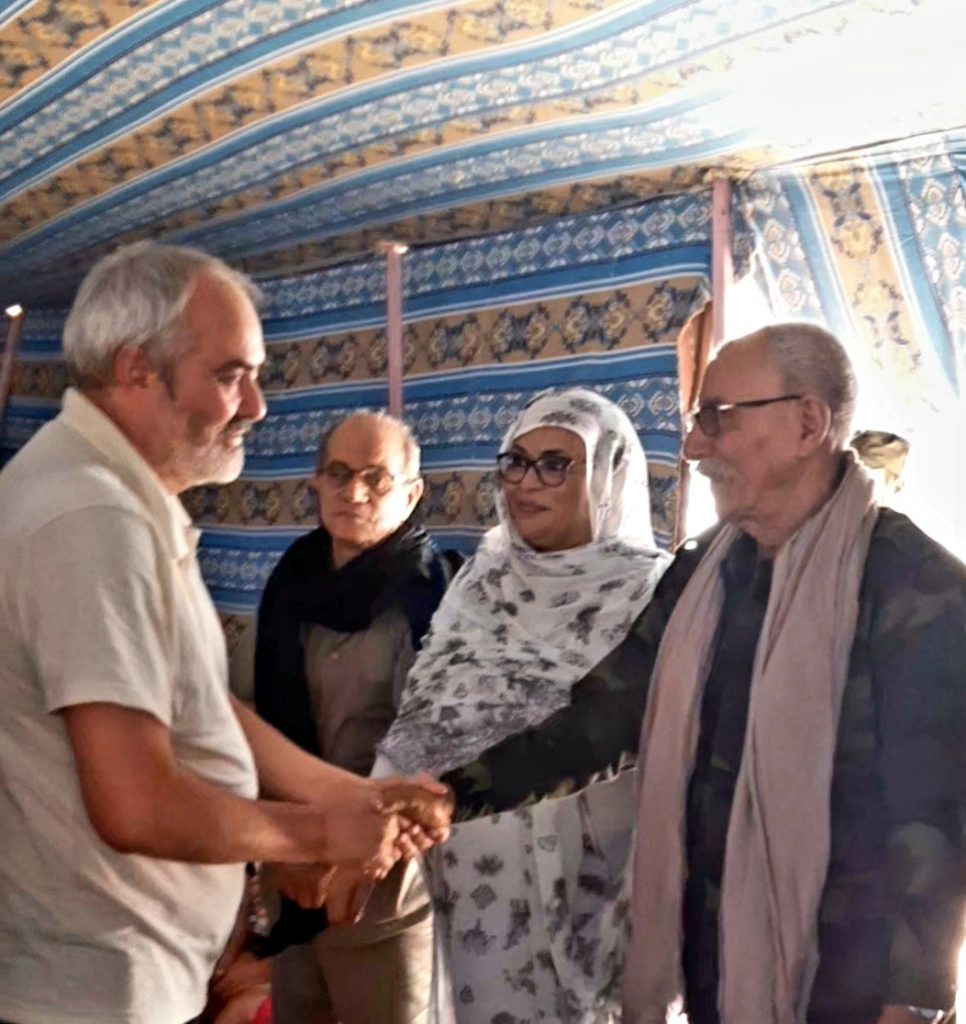
Más voceros que nunca de la causa saharaui
Por la noche, con la casa a oscuras por un corte de luz, compartimos la cena y los últimos vasos de té con la familia que nos acogió. Después partimos con Chaiaa, en un convoy escoltado hacia el aeropuerto de Tinduf para emprender el regreso. Nos fuimos cansados por la intensa actividad en medio de un calor agobiante, pero optimistas por la continuidad de la lucha. Orgullosos por las campañas internacionales que venimos realizando. Y contentos de haber estrechado vínculos con la justa causa saharaui por la libertad, de la cual seguiremos siendo voceros en cada país de los cinco continentes en que se encuentra la LIS.

